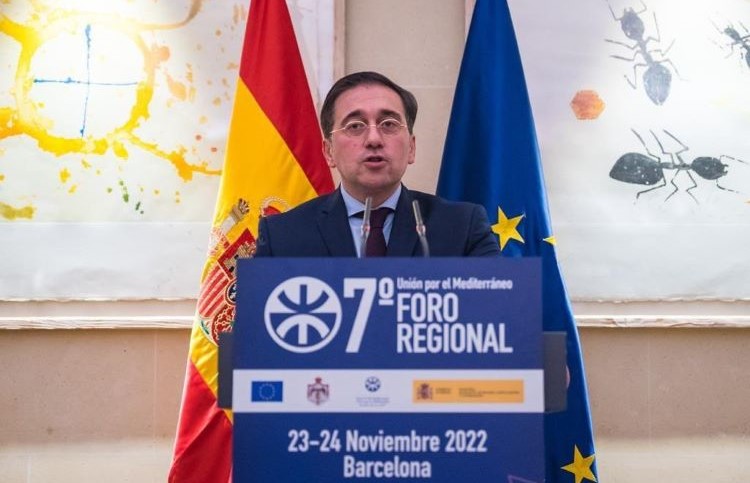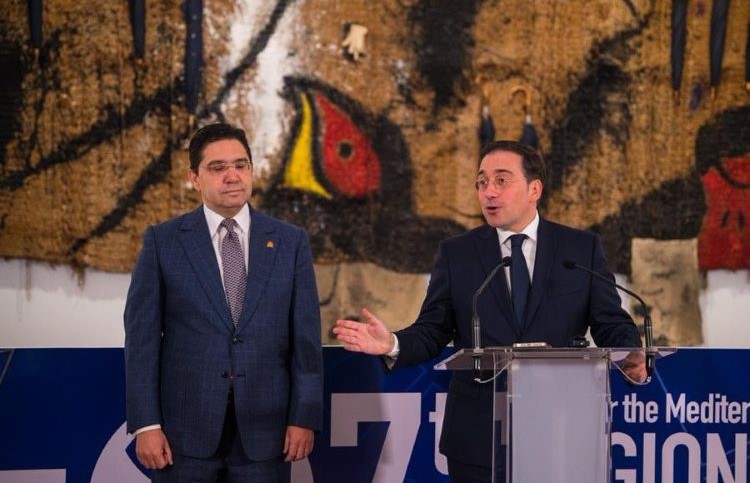The Diplomat
The Minister of Foreign Affairs, José Manuel Albares, yesterday proposed holding a summit between the EU and Mediterranean leaders during the next Spanish Presidency, in the second half of 2023.
The Government wishes to “place the Euro-Mediterranean agenda at the center of its Presidency” and, therefore, a summit between the EU and Mediterranean leaders “would be the culmination” of this “Euro-Mediterranean accent” to which Spain aspires, said Albares at the press conference following the VII Regional Forum of the Union for the Mediterranean (UfM), which was held yesterday at the Joan Miró Foundation in Barcelona.
The aim of this summit would be to bring together the heads of state and government of the 27 EU countries with their counterparts from Morocco, Algeria, Tunisia, Libya, Egypt, Israel, Palestine and Jordan. The last Euro-Mediterranean summit was held in 2008 in Paris. If the idea succeeds, it would be the second bi-regional summit during the Spanish Presidency, together with the EU-Latin America and the Caribbean (EU-CELAC) summit in Brussels.
Albares participated yesterday in the opening of the VII Regional Forum, which brought together the foreign ministers of the 42 member states of the UfM (the 27 EU countries plus 15 other countries from both shores of the Mediterranean (Albania, Algeria, Bosnia and Herzegovina, Egypt, Israel, Jordan, Lebanon, Mauritania, Monaco, Montenegro, Morocco, Palestine, Tunisia, Turkey and, as an observer, Libya; Syria froze its participation in the UfM in December 2011). Algeria, which withdrew its ambassador to Madrid last March, sent its representative to the EU. Algerian foreign minister, Ramtan Lamamra, is in Niamey, capital of Niger, to participate in a meeting of the Executive Council of the African Union.
The list was expanded yesterday with the entry of a new member state, North Macedonia, with whose Foreign Minister, Bujar Osmani, held a bilateral meeting Albares to address “the challenges of the Euro-Mediterranean region”, deepen “our cooperation within the OSCE and NATO” and transfer “the support of Spain to the European path” of his country, as reported by the minister via Twitter. This is the first accession since the creation of the UfM in 2008.
During his speech, Albares advocated overcoming the imbalances between the two shores of the Mediterranean through three objectives: more integration, greater sustainability and greater cohesion. He also announced that the Spanish Agency for International Development Cooperation (AECID) will sign an agreement with the Anna Lindh Foundation, valued at half a million euros, for social inclusion projects in the Euro-Mediterranean region.
For his part, the High Representative of the European Union for Foreign Affairs and Security Policy, Josep Borrell, stated that efforts must be intensified to “close the gap” between the two shores of the Mediterranean, “one of the most unequal borders in the world”, and urged, to this end, to strengthen regional integration and to promote “connectivity, both in terms of infrastructure and regulation”. Precisely, during the Regional Forum, the Medusa project was presented, a 7,100-kilometer submarine fiber optic cable that will link the two shores of the Mediterranean for the first time. According to the European Commissioner for Neighborhood and Enlargement, Olivér Várhelyi (with whom Albares also met), it is expected to be operational by the end of 2024 or early 2025, with an estimated useful life of 25 years.
Among the regional initiatives approved yesterday by the UfM is the Mediterranean Capitals of Culture project, under which the 43 countries of the organization will annually designate two cities on the northern and southern shores of the Mediterranean as Capitals of the Mediterranean to promote cultural, socioeconomic and sporting activities and encounters, and to highlight the cities’ heritage and mutual understanding between the two shores.
Albares also met yesterday with Jordan’s Minister of Foreign and Expatriate Affairs (and UfM co-chair), Ayman Safadi; and his counterparts from Bosnia and Herzegovina, Bisera Turkovic; Palestine, Riad Malki; Mauritania, Mohamed Salem Uld Merzug; and Libya, Najla Elmangoush.
EU-Southern Neighborhood
In the afternoon, the Joan Miró Foundation in Barcelona also hosted the fourth ministerial meeting between the EU and the Southern Neighborhood, which focused on the new 2021 Mediterranean agenda (urban development, resilience, digital transformation, peace and security, migration and mobility, and green transition), the consequences of the war in the region in terms of energy security and food crisis, and the institutional architecture of the Southern Neighborhood itself, which is less structured than the Eastern Neighborhood. The meeting brought together the foreign ministers of the 27 EU states and nine countries from the southern shores of the Mediterranean: Algeria, Egypt, Israel, Jordan, Lebanon, Libya, Morocco, Palestine and Tunisia. Syria’s participation is suspended.
This is the fourth meeting between the two blocs since 2015 (when the first edition was held, followed by two others in 2018 and 2021). Precisely, according to Foreign Ministry sources, one of Spain’s major objectives is precisely to ensure that this meeting is held more regularly and with the same degree of institutional representation as the meeting between the EU and the Eastern Neighborhood.







